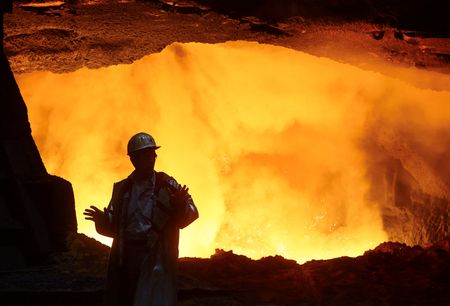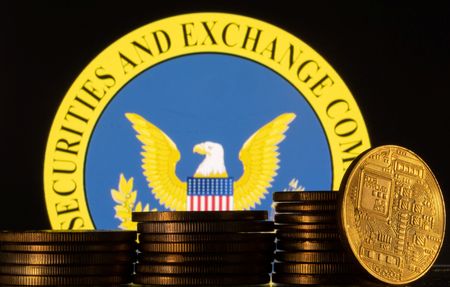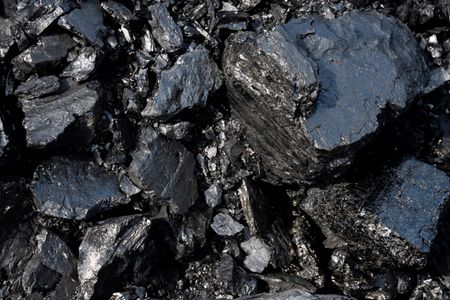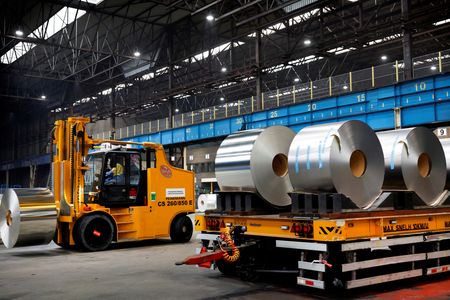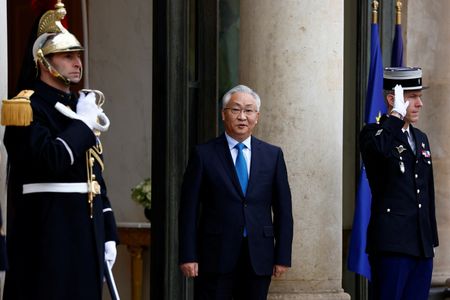By Steve Holland and Philip Blenkinsop
WASHINGTON/BRUSSELS (Reuters) -Mexico, Canada and the European Union on Tuesday condemned U.S. President Donald Trump’s decision to impose tariffs on all steel and aluminium imports next month, a move that has fanned fears of a trade war.
Trump signed proclamations late on Monday raising the U.S. tariff rate on aluminium to 25% from his previous 10% rate and eliminating country exceptions and quota deals as well as hundreds of thousands of product-specific tariff exclusions for both metals.
The measures, which will take effect on March 12, will apply to millions of tons of steel and aluminium imports from Canada, Brazil, Mexico, South Korea and other countries that had been entering the U.S. duty free under the carve-outs.
Mexican Economy Minister Marcelo Ebrard said on Tuesday that the tariff decision was “not justified” and “unfair”.
Canada’s Prime Minister Justin Trudeau called the tariffs “unacceptable”.
European Commission President Ursula von der Leyen joined the condemnation, saying the 27-nation bloc would take “firm and proportionate countermeasures”. Von der Leyen was meeting U.S. Vice President JD Vance at an AI summit in Paris on Tuesday.
The move will simplify tariffs on the metals “so that everyone can understand exactly what it means,” Trump told reporters. “It’s 25% without exceptions or exemptions. That’s all countries, no matter where it comes from, all countries.”
Trump said he would follow with announcements about reciprocal tariffs on all countries that impose duties on U.S. goods over the next two days, and said he was also looking at tariffs on cars, semiconductors and pharmaceuticals.
Asked about threats of retaliation by other countries against his new tariffs, Trump said: “I don’t mind.”
READY TO RETALIATE
In figures likely to further irk Trump, Germany’s trade surplus with the U.S. reached a record level last year of 70 billion euros ($72.3 billion), according to data from the German statistics office.
European Commission head Von der Leyen said she deeply regretted the U.S. decision, adding that tariffs were taxes that were bad for business and worse for consumers. EU steel exports to the U.S. have averaged about 3 billion euros ($3.1 billion) a year over the past decade.
“Unjustified tariffs on the EU will not go unanswered – they will trigger firm and proportionate countermeasures. The EU will act to safeguard its interests,” she said in a statement.
One option for the EU would be to reactivate the tariffs it imposed in 2018 that were suspended under a truce agreed between Von der Leyen and then-U.S. president Joe Biden.
The EU tariffs on U.S. products such as bourbon, motorcycles and orange juice are currently suspended until the end of March.
The American Chamber of Commerce to the EU (AmCham EU), representing U.S. companies active in Europe, also criticised the move as harmful to jobs, prosperity and security on both sides of the Atlantic.
“The damage will extend beyond just the steel and aluminium sectors, impacting all businesses that rely on these materials throughout the supply chain,” it added in a statement.
Trump’s latest trade salvo pushed gold prices to a record high on Tuesday on safe-haven demand in Asian trading before retreating.
CANADA TO DEFEND ITSELF
Steel imports accounted for about 23% of American steel consumption in 2023, according to American Iron and Steel Institute data, with Canada, Brazil and Mexico the largest suppliers.
Canada, whose abundant hydropower resources aid its metal production, accounted for nearly 80% of U.S. primary aluminium imports in 2024.
Speaking on the sidelines of the Paris artificial intelligence summit, Prime Minister Trudeau said Canada would seek to highlight the negative impact of the U.S. tariffs and, if necessary, its response would be firm and clear.
“Canadians will stand up strongly and firmly if we need to,” he said.
Trump also will impose a new North American standard requiring steel imports to be “melted and poured” and aluminum to be “smelted and cast” within the region to curb U.S. imports of minimally processed Chinese and Russian metals that circumvent other tariffs.
While China exports only tiny volumes of steel to the U.S., it is responsible for much of the world’s excess steel capacity, according to the U.S. It says subsidised production in China forces other countries to export more and leads to transshipment of Chinese steel through other countries into the U.S. to avoid tariffs and other trade restrictions.
($1 = 0.9684 euros)
(Reporting by Steve Holland, Andrea Shalal, Jeff Mason and David Lawder; Writing by David Lawder, Andy Sullivan and Keith Weir; Additional reporting by Lidia Kelly in Melbourne, David Ljunggren and Costas Pitas; Editing by Sharon Singleton, Christina Fincher and Angus MacSwan)

